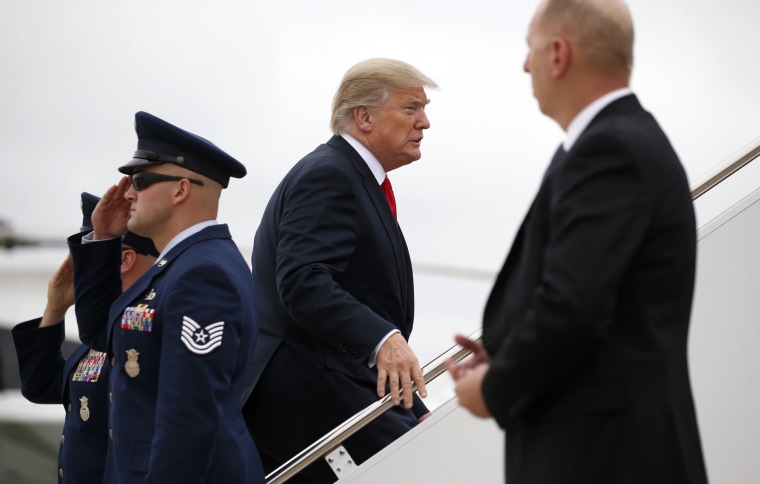WASHINGTON — President Donald Trump's top advisers briefed lawmakers Wednesday ahead of decision by the president on the fate of the Iran nuclear deal. White House officials said the pending decision wasn't shared, but several officials said they left the briefings convinced that Trump plans to decertify the deal, three officials told NBC News.
The president's decision comes ahead of a deadline Sunday that triggers a 60-day window for lawmakers to determine whether to reimpose sanctions related to Iran's nuclear program that were lifted as part of the 2015 agreement.
Trump's national security adviser, H.R. McMaster, briefed lawmakers on the president's pending decision on Wednesday and proposed legislation to amend the original Obama-era agreement — something Congress doesn't have the authority to do — two of the officials said.
The White House denied that McMaster told lawmakers about the president's plans, but officials said McMaster left no doubt that Trump intends to decertify, as he has indicated numerous times in the past.
Secretary of State Rex Tillerson was also scheduled to brief lawmakers Wednesday as part of the administration's final sales pitch to tackle what it views as problematic elements of the nuclear agreement and to crack down on Iranian efforts to undermine peace in the Middle East.
The administration specifically wants to renegotiate the sunset clause in the nuclear deal, which has it expiring 10 years after it goes into effect, the provisions on inspections — the United States wants them to be more stringent and to expand access to Iran's military sites — and to curtail Iran's ballistic missile program, two senior administration officials and a person familiar with the ongoing policy discussions said.
Related: The Art of the 'Worst' Deal: Trump Blasts Iran Agreement
Administration and congressional sources say that the decision to decertify is part of a larger strategy to crack down on Iran's missile program and its support for terrorism. The administration is also working to convince lawmakers that while it concedes Iran is in compliance with its obligations under the nuclear agreement, it is engaging in destabilizing activities across the region, from supporting Syrian President Bashar al-Assad, to funding and arming Hezbollah fighters, and that it should be punished through crippling sanctions.
Congress already imposed new sanctions this year as part of a legislative package that targeted Russia, part of a broader plan by the administration to clamp down on the Iranian regime ahead of the rollout of its official Iran policy.
Trump often denounced the nuclear agreement on the campaign trail, once describing it as "a deal at the highest level of incompetence."

Legislation passed in 2015 requires the president to certify Iranian compliance every 90 days, something President Barack Obama reluctantly agreed to in the face of bipartisan concern about whether Iran could be trusted to remain in accord with the agreement.
Trump has now twice provided that certification, even as he maintains that the agreement was flawed and that Iran has violated "the spirit" of it. When the White House last certified Iran's compliance in July, it stated that Iran had "not taken any action, including covert activities, that could significantly advance its nuclear weapons program."
Still, despite his campaign promise to scrap the agreement, Trump's decision to decertify is receiving significant pushback, even by members of his own administration. Pressed by lawmakers last week, Defense Secretary Jim Mattis responded "yes" when asked if he thinks the deal is in America's national security interest.
Earlier Wednesday, Rep. Ed Royce, R-Calif., chairman of the Foreign Relations Committee, said at a hearing that "as flawed as the deal is, I believe we must now enforce the hell out of it."
While in his opening statement Royce was critical of the Iran deal and called for a crackdown on Iranian misbehavior around the world, he also urged for a tempered response.
"Whatever he decides, it is critical that the president lay out the facts," Royce added, saying he hopes "the president will define a responsible path forward to confront the full range of threats posed by Iran."
Despite repeated promises on the campaign trail, administration and congressional sources say it's unlikely Trump will scrap the deal. Critics say that such proclamations were meant to appease his base.
"This is more of a political maneuver than a strategic decision," Sen. Jack Reed, D-R.I., ranking member of the Senate Armed Services Committee, said Friday on MSNBC.
Last month, Iranian President Hassan Rouhani told NBC's Lester Holt in an interview that decertification is tantamount to withdrawing from the agreement, and will have consequences.
"No one will trust America again," he said.
Key allies, including Britain, France and Germany — known as the E3 — are warning that even without withdrawing, the new policy could isolate the U.S., strengthen Russia and China and signal to North Korea that it's a waste of time to negotiate with the Trump administration.
Officials briefed on the plan said no decisions have been made about whether to ramp up pressure on the Islamic Revolutionary Guard Corp,or IRGC, through a terrorism designation — an idea that has been floated by lawmakers and administration officials looking to take a hardline against the Islamic Republic.
The IRGC, a vast, powerful military conglomerate, with naval, air and ground components organized in parallel to the conventional Iranian military, is the country's biggest economic player, with a hand in virtually every sector, from oil and gas to auto-making, telecommunications, construction, farming and beyond.

